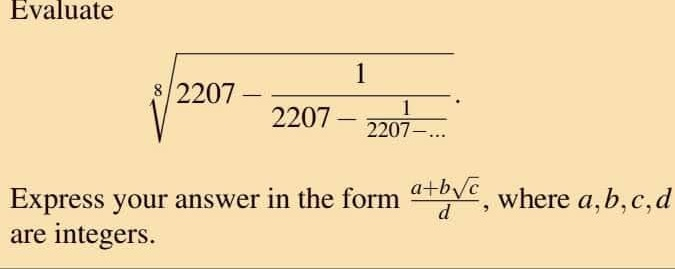
AlgebraQuestion and Answers: Page 312
Question Number 61707 Answers: 0 Comments: 1
Question Number 61706 Answers: 0 Comments: 1
$$\frac{\mathrm{7}^{\mathrm{10}} }{\mathrm{7}^{\mathrm{7}} } \\ $$
Question Number 61691 Answers: 0 Comments: 0
Question Number 61652 Answers: 1 Comments: 1
Question Number 61651 Answers: 0 Comments: 4
Question Number 61650 Answers: 0 Comments: 4
Question Number 61605 Answers: 0 Comments: 7
$${solve}\:\:{at}\:{Z}^{\mathrm{2}} \:\:\:\:\mathrm{2}{x}\:+\mathrm{5}{y}\:=\mathrm{4} \\ $$
Question Number 61591 Answers: 1 Comments: 8
Question Number 61526 Answers: 0 Comments: 0
Question Number 61495 Answers: 1 Comments: 7

Question Number 61490 Answers: 0 Comments: 10
Question Number 61470 Answers: 1 Comments: 0
Question Number 61343 Answers: 1 Comments: 0

Question Number 61320 Answers: 1 Comments: 0
Question Number 61272 Answers: 0 Comments: 0

Question Number 61273 Answers: 2 Comments: 2
Question Number 61269 Answers: 3 Comments: 0
Question Number 61268 Answers: 0 Comments: 0
Question Number 61267 Answers: 0 Comments: 0

Question Number 61211 Answers: 1 Comments: 3
Question Number 61162 Answers: 1 Comments: 3
Question Number 61140 Answers: 1 Comments: 1
Question Number 61137 Answers: 1 Comments: 0
Question Number 61117 Answers: 2 Comments: 0
Question Number 61111 Answers: 1 Comments: 2
Question Number 60980 Answers: 1 Comments: 2
Pg 307 Pg 308 Pg 309 Pg 310 Pg 311 Pg 312 Pg 313 Pg 314 Pg 315 Pg 316
